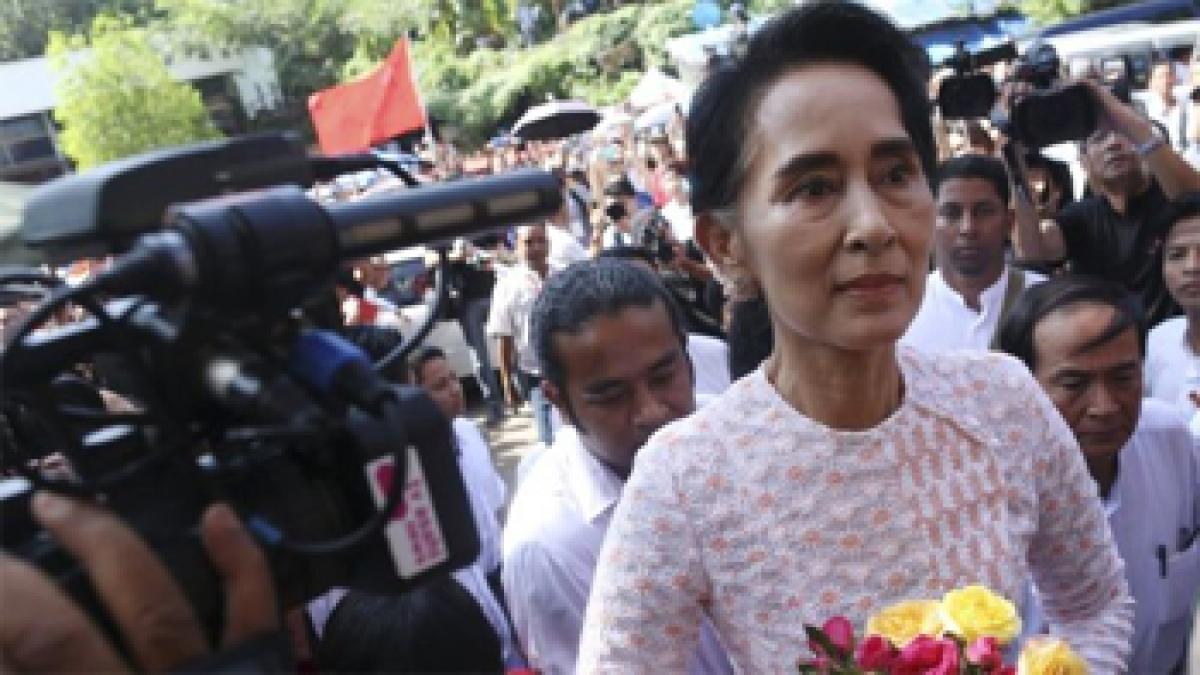Live
- NASA Tracks Five Giant Asteroids on Close Approach to Earth Today
- Pushpa 2 Hits ₹1000 Crore in 6 Days: How It Compares to Other Top Indian Films
- Vivo X200 and X200 Pro Launched in India: Price, Specifications, and Features
- Nitin Gadkari Admits Feeling Embarrassed at Global Summits Over Rising Road Accidents in India
- Comprehensive Review on Indiramma Housing Survey and Welfare Initiatives Conducted via Video Conference
- Jogulamba Temple Records Rs 1.06 Crore Hundi Revenue in 150 Days
- Opposition Slams ‘One Nation, One Election’ Bill as Anti-Democratic; BJP Allies Support the Move
- Celebrate Karthigai Maha Deepam Virtually with Sri Mandir’s LIVE Darshan Experience
- BJP Extends Support to Samagra Shiksha Abhiyan Employees' Strike, Demands Immediate Regularization and Welfare Benefits
- Dr. M. Priyanka Stresses Quality Education, Nutritious Meals, and Cleanliness in Schools
Just In

Aung San Suu Kyi\'s journey in the battle for democracy, much of which was spent in detention, has culminated into being appointed Myanmar\'s new foreign minister, though she has had made it clear that she will wield more effective power than the country\'s president.
Aung San Suu Kyi's journey in the battle for democracy, much of which was spent in detention, has culminated into being appointed Myanmar's new foreign minister, though she has had made it clear that she will wield more effective power than the country's president.
Suu Kyi was sworn-in on Wednesday and will concurrently hold three other portfolios in the government led by her confidant and handpicked President U Htin Kyaw. She will also be the minister in the president's office, minister of education and minister of electricity and energy.
The international icon for democracy, Suu Kyi peacefully fought the country's oppressive military regime that put her under house arrest for 15 years, in a bid to quell her efforts to make the people of the Southeast Asian nation the real fountainhead of power.
But "The Lady" -- as she came to be known as -- never succumbed to the ruling junta and continued her battle even when she was held incommunicado in Rangoon, now called Yangon.
Suu Kyi, inspired by Martin Luther King and Mahatma Gandhi, was in detention in some or the other form during much of her time between 1989 and 2010. But she battled on earning herself an iconic status that made her an international symbol of peaceful resistance in the face of oppression.
She won the Nobel Peace Prize in 1991 when the committee chairman for the award called her "an outstanding example of the power of the powerless".
And when finally power came to her, she was barred from becoming president because the country's constitution, written by the military, prevents anyone with close family ties to someone who "owe allegiance to a foreign power". Suu Kyi's two sons are British passport holders.
Nevertheless, the 70-year-old leader has vowed to take up a role "above the president". How that would be practiced is not clear. But, with her lifelong friend and confidant sworn in as the new president, Suu Kyi may not be too far from calling the shots -- even though remotely.
Suu Kyi, the daughter of Myanmar's independence hero, General Aung San, was born in 1945. Her father was assassinated during the transition period in July 1947, just six months before independence, when she was only two.
She went to an elite English medium school in Burma until 1960. In that year, her mother was appointed ambassador to India and the young Suu Kyi further studied at Delhi University before she went to Oxford, where she met her future husband, the British scholar Michael Aris.
The couple had two children. She was living a quiet life with her family in the United Kingdom until 1988. She returned to her homeland when her mother fell ill, leaving behind her husband and sons to nurse her dying mother.
But she found that her nation needed her more when she saw the mass slaughter of Burmese who had risen against the brutal rule of military strongman U Ne Win. She raised her voice and began a non-violent struggle for democracy and human rights.
During her continuous detention, she was offered permission to visit her family in the UK. She refused. She knew if she left, she won't be allowed to return. Her husband died in 1999 and she could not even attend his last rites.
Restrictions were finally relaxed in 2011. She was allowed to travel outside Yangon and hold political rallies for the National League for Democracy (NLD). She was allowed to contest elections for the first time In January 2012. She won easily in the elections and was sworn as a parliamentarian.
That year Suu Kyi visited Thailand, her first trip outside Myanmar since 1988. She also travelled to Europe and China.
Her NLD won the landmark elections in November 2015. The party secured large enough majorities of seats in both legislative chambers to allow the party to form the new government.
Despite her iconic status of political freedom, Suu Kyi has come under fire from human rights advocates all over the world for failing to defend Myanmar's Rohingya minority. Members of the ethnic group -- mostly Muslims -- are subjected to harsh and humiliating restrictions, including forced labour. They don't have citizenship rights.
She was recently accused of Islamophobia when she was shown apparently getting angry in a 2013 interview being conducted by BBC presenter Mishal Hussain. The interview appeared in news last week when British media reported that she was so angered by the interview's focus on Rohingya that she was heard muttering, presumably to an aide, "No one told me I was going to be interviewed by a Muslim."
But those may be seen as minor blips in the life of a woman who stood as a bulwark against the all-encompassing power of a military junta.

© 2024 Hyderabad Media House Limited/The Hans India. All rights reserved. Powered by hocalwire.com







